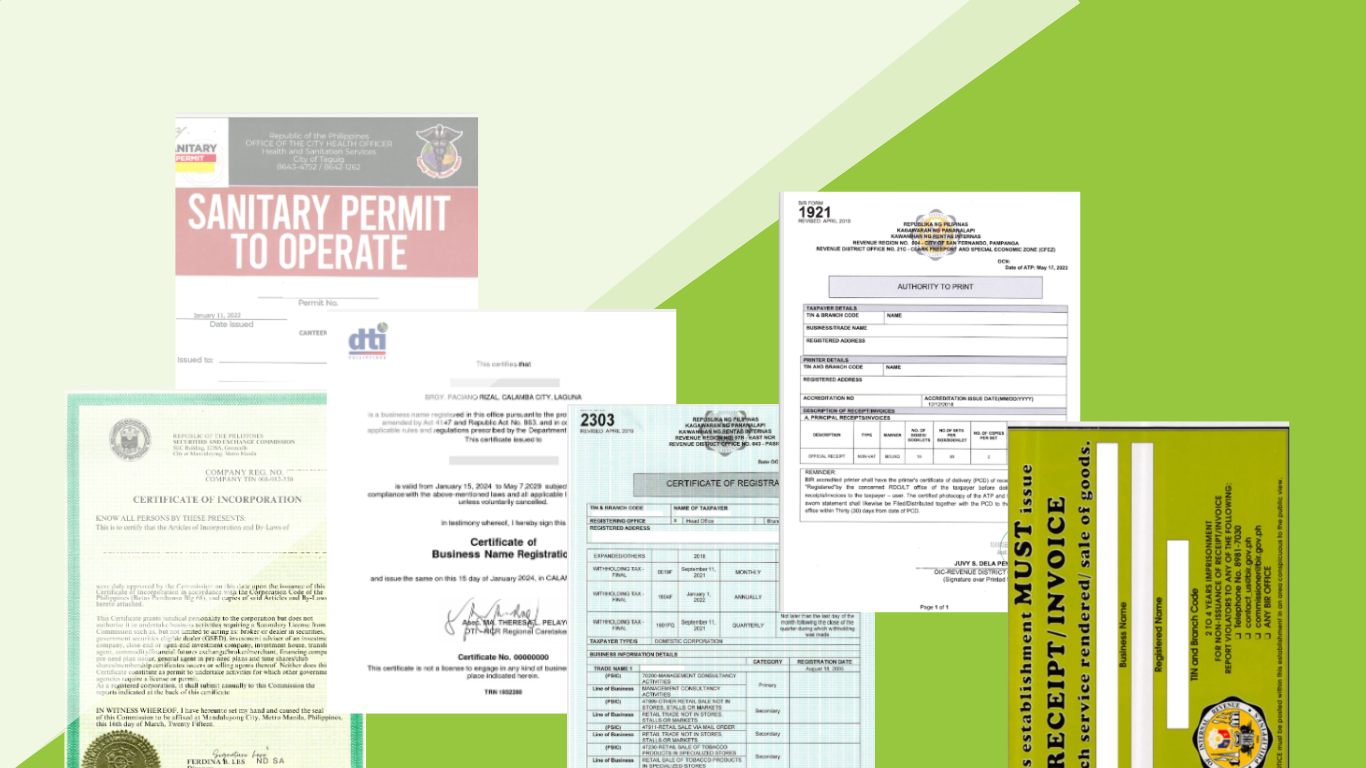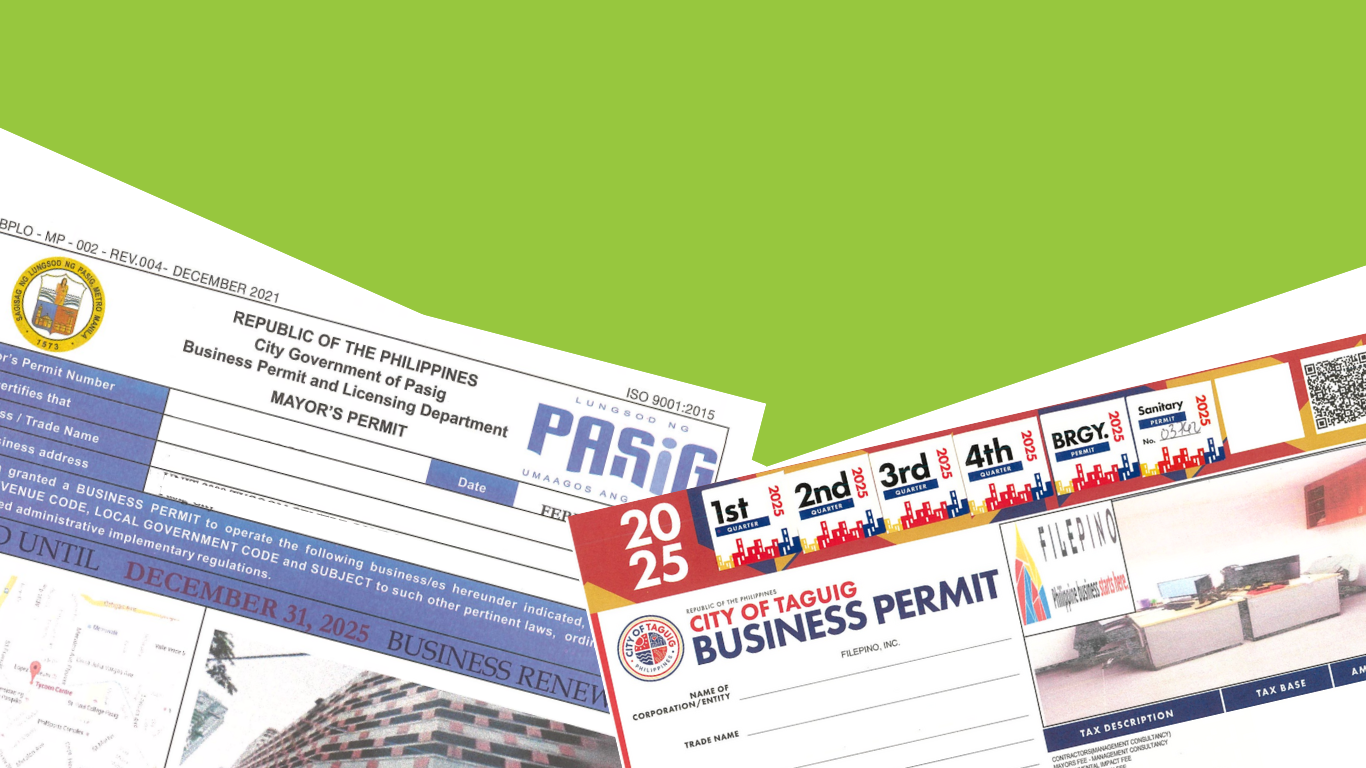Based on the Philippine Statistics Authority (PSA) report, the Philippine economy grew by 5.4% in the first quarter of 2025 compared to the same period last year. This growth means that the country produced more goods and services than it did in early 2024, proving that the country is a growing economy. The main contributors to this growth were wholesale and retail trade.
The majority of the entrepreneurs see this growth as an opportunity to establish a business in the Philippines. According to the Department of Trade and Industry (DTI), there are over 957,620 commercial companies in operation. This shows that the country is considered as an ideal destination for establishing a business and taking advantage of the growing markets and competent workforce.
Registering a business in the Philippines may be challenging especially as there are a lot of documentary requirements to be submitted and regulations to be followed. In this comprehensive guide, you’ll learn about the business registration process, requirements, and costs with the Philippine governments.
Business Registration Process in the Philippines
Here’s a step-by-step guide of the business registration process:
STEP 1: Register with SEC, DTI or CDA
To initiate the process, register your business with the Securities and Exchange Commission (SEC) for partnerships and corporations; Department of Trade and Industry (DTI) for sole proprietorship; and Cooperative Development Authority (CDA) for cooperatives.
STEP 2: Get a Barangay Clearance and Mayor’s Permit
Visit the Barangay Hall or Office of the Barangay Captain of the Barangay with jurisdiction on your business address. Submit the required documents and pay the necessary fees to secure a Barangay Business Clearance.
Once you have secured the clearance, you may now process your LGU Business Permit or Mayor’s Permit with the Business Permits and Licensing Office (BPLO) or Business One-Stop Shop (BOSS) at your city or municipality.
STEP 3: Register with BIR
Even though your Mayor’s Permit is still in process, you can register your business with the Bureau of Internal Revenue (BIR) for the issuance of a Taxpayer Identification Number (TIN), BIR Certificate of Registration (COR), and other documents for tax compliance purposes.
STEP 4: Employer Registrations
If you are planning to hire employees, it is recommended that you also start to process your employer registrations with the Social Security System (SSS), Philippine Health Insurance Corporation (PhilHealth), and Home Development Mutual Fund (Pag-Ibig Fund).
STEP 5: Open a Corporate Bank Account
After securing all the business documents, you can finally open a corporate bank account registered with your company name. It is crucial that you consider the availability of banking facilities, including payroll, tax filing, and remittance of statutory contributions.
Business Registration Requirements in the Philippines
There are a set of requirements for each government agency. Note that these requirements may vary due to updates in rules and regulations.
SEC Registration Requirements
You may register your business with the Securities and Exchange Commission (SEC) through the SEC Electronic Simplified Processing of Application for Registration of Company (eSPARC). The online application system requires the following:
Proposed Business Name
Applicant or Authorized Representative’s Details
Company Type and Industry
Description of the Business
Office Address
Corporate Term
Incorporator’s Details
Capitalization
Corporate Officers
Date of Annual General Meeting
Fiscal Year
Name Appeal, if the proposed business name is rejected or unavailable
Additional requirements, if applicable
Business Permit Requirements
The requirements for business permits may vary across Local Government Units (LGUs). In this regard, you must coordinate with your city or municipal Business Permits and Licensing Office (BPLO). However, the documentary requirements usually include:
BPLO Application Form
Application Form for Other Clearances and Permits
Lease Contract or other equivalent documents
Certificate of Occupancy
SEC Certificate of Incorporation
Locational Map via Google Maps
Pictures of Office Location
Corporate Logo
List of Employees, if applicable
Employee’s Medical Certificate, depending on the LGU
Other Certificates and Affidavits, depending on the LGU
Board Resolution and Secretary’s Certificate, if processed by an authorized representative
BIR Registration Requirements
The following documents must be submitted when applying for a business registration with the Bureau of Internal Revenue (BIR):
Application for Registration or BIR Form 1903
Application for Authority to Print Official Receipts and Invoices or BIR Form 1906
Application for Registration Information Update or BIR Form 1905
Photocopy of SEC Certificate of Incorporation, for domestic corporations
Photocopy of SEC Certificate of Recording, for partnerships
Photocopy of License to Do Business in the Philippines, for foreign corporations
Articles of Incorporation
Notarized Lease Contract or other equivalent documents
BIR Printed Receipts and Invoices or final and clear sample of principal receipts and invoices
Books of Accounts
Franchise Documents, for common carriers
Memorandum of Agreement, for joint ventures
Franchise Agreement, if applicable
Certificate of Authority, for Barangay Micro Business Enterprises (BMBE) registered entity
Proof of Registration or Permit to Operate with BOI, BOI-ARMM, SBMA, BCDA, PEZA, etc., if applicable
Board Resolutions and Secretary’s Certificates, if processed by an authorized representative
SSS Employer Registration Requirements
Below are the documents required when processing an employer registration with the Social Security System (SSS):
Employer Registration Form or SSS Form R-1
Employment Report or SSS Form R-1A
Specimen Signature Card or SSS Form L-501
SSS Web Registration for Employer Form
List of Employees and their Details
Business Registration Documents
Authorization Letter, if processed by an authorized representative
PhilHealth Employer Registration Requirements
The following documents must be submitted when processing an employer registration with the Philippine Health Insurance Corporation (PhilHealth):
PhilHealth Employer Data Record or ER1
PhilHealth Report on Employee-Members or ER2
PhilHealth Online Access Form 001 or POAF 001
PhilHealth Employer’s Engagement Representative (PEER) Information Sheet
List of Employees and their Details
Business Registration Documents
Authorization Letter, if processed by an authorized representative
Pag-IBIG Fund Employer Registration Requirements
Below are the requirements when processing an employer registration with the Pag-IBIG Fund:
Employer’s Data Form (EDF)
Specimen Signature Form
eSRS Employer Enrollment Form
Employer’s Virtual Pag-IBIG Enrollment Form
Duly Received/Stamped SSS Form R-1A
Business Registration Documents
Authorization Letter, if processed by an authorized representative
Corporate Bank Account Opening Requirements
Each banks have different requirements, but it usually includes the following documents:
Customer Information Form
Account Details Form
Online Banking Form
System Administrator Designation Form
Signature Cards
Corporate Secretary Certificate
SEC Certificate of Incorporation
Company Bylaws
General Information Sheet (GIS)
Photocopies of valid IDs of signatories
It is advisable to check the official websites of the government agencies to be informed about the latest requirements as it may change from time to time.
Business Registration Costs in the Philippines
Here are the sample breakdown of business registration fees on each government agencies:
SEC Registration Fees
Type of Fees | Cost |
SEC Registration (⅕ of 1% of the authorized capital) | PHP 2,000 |
Stock and Transfer Book (STB) Registration | PHP 150 |
Company Bylaws | PHP 1,000 |
Name Verification and Reservation | PHP 100 |
Documentary Stamp Tax (DST) | PHP 30 |
Legal Research | PHP 30 |
TOTAL AMOUNT: PHP 3,310 | |
Business Permit Fees
Type of Fees | Cost |
Mayor’s Permit, Business Tax, and other local fees | PHP 2,500 |
Community Tax (Cedula) | PHP 500 |
Zoning Fee | PHP 100 |
Barangay Clearance | PHP 1,000 |
Business Plate | PHP 500 |
Comprehensive Liability Insurance | PHP 1,570 |
TOTAL AMOUNT: PHP 6,170 | |
BIR Registration Fees
Type of Fees | Cost |
Annual Registration | PHP 500 |
BIR Certification | PHP 115 |
DST on Shares | PHP 5,000 |
DST on Lease | PHP 960 |
Books of Accounts | PHP 300 |
Official Receipts and Invoices | PHP 5,000 |
TOTAL AMOUNT: PHP 11, 875 | |
Other Expenses
Type of Fees | Cost |
Notary, Transportation, Printing, etc. | PHP 20,000 |
Stock and Transfer Book (STB) | PHP 470 |
Dry Seal | PHP 2,500 |
Frames for Certificates and Permits | PHP 500 |
Initial Deposit for Corporate Bank Account | PHP 50,000 |
TOTAL AMOUNT: PHP 73, 470 | |
Note that these fees may vary depending on your location, availability of own resources, and preferred bank. This is only an estimate to help you prepare your budget.



